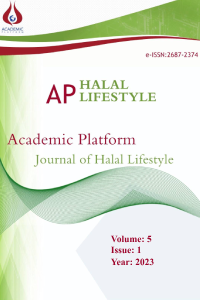Case Report
Research Article
Aim & Scope
Creating a platform to meet up the rigorous scientific studies with not only the scholars/researchers from various disciplines, but also those who are prioritizing concept and awareness of Halal and willing to adapt their lifestyle.
Since it covers the all aspects of life, framing the scope of Halal Life is very tough and complicated. However, The reflections and projections upon the existence, allow stalkers to understand and explain sensible, observable, and measurable phenomena. The four dimensions of existence which inspire and enlighten our understanding, are spiritual, physiological, social and ecological existence. The scholars/researchers who directly or indirectly interested in the concept, awareness, sensitivity, and practice of Halal from varieties of disciplines, are most welcomed and encouraged to consider AP Halal Lifestyle as a publication port, such as mentioned below but not limited research areas: • Phenomena of psychic and mental health: Just as example, faith, moral purpose of life and existence, meaningful life, inner peace, perception and eagerness of infinity etc.
• Phenomena of physiological existence: Just as example, physilogical health: healthcare, medicine, food, nutrition, Individual responsibilities, consciousness and awareness toward physiological existence, physiological health and balanced life etc.
• Phenomena of human - life context: Just as examples, Halal production and consumption, life dynamics, economics, finance, business, perception, interest, travel, leisure, knowledge, attitude, behavior, consciousness, will, necessity, availability, ability, etc.
• Phenomena of human – society context: Just as examples, living togetherness, justice, righteousness, moral, ethics, the balance of rights and obligations, virtue, merit, competency, family, society, career etc.
• Phenomena of human – ecology context: Just as examples, awareness of trust, sustainability, equilibrium, waste, the relationship with non-humans etc.
Author Guidelines
You can reach the author guidelines here.
Ethical Principles and Publication Policy
Peer Review Policy
Academic Platform Journal of Halal Lifestyle (APJHLS), applies double blind peer-review process in which both the reviewer and the author are anonymous. Reviewer selection for each submitted article is up to area editors, and reviewers are selected based on the reviewer’s expertise, competence, and previous experience in reviewing papers for APJHLS.
Every submitted article is evaluated by area editor, at least, for an initial review. If the paper reaches minimum quality criteria, fulfills the aims, scope and policies of APJHLS, it is sent to at least two reviewers for evaluation.
The reviewers evaluate the paper according to the Review guidelines set by editorial board members and return it to the area editor, who conveys the reviewers' anonymous comments back to the author. Anonymity is strictly maintained.
The double blind peer-review process is managed using “ULAKBİM Dergi Sistemleri”, namely Dergipark platform.
Open Access Policy
APJHLS provides immediate open access for all users to its content on the principle that making research freely available to the public, supporting a greater global exchange of knowledge.
Archiving Policy
APJHLS is accessed by Dergipark platform which utilizes the LOCKSS system to create a distributed archiving system among participating libraries and permits those libraries to create permanent archives of the journal for purposes of preservation and restoration.
Originality and Plagiarism Policy
Authors by submitting their manuscript to APJHLS declare that their work is original and authored by them; has not been previously published nor submitted for evaluation; original ideas, data, findings and materials taken from other sources (including their own) are properly documented and cited; their work does not violate any rights of others, including privacy rights and intellectual property rights; provided data is their own data, true and not manipulated. Plagiarism in whole or in part without proper citation is not tolerated by APJHLS. Manuscripts submitted to the journal will be checked for originality using anti-plagiarism software.
Journal Ethics and Malpractice Statement
For all parties involved in the publishing process (the author(s), the journal editor(s), the peer reviewers, the society, and the publisher) it is necessary to agree upon standards of expected ethical behavior. The ethics statements for APJHLS are based on the Committee on Publication Ethics (COPE) Code of Conduct guidelines available at www.publicationethics.org.
1. Editor Responsibilities
Publication Decisions & Accountability
The editor of APJHLS is responsible for deciding which articles submitted to the journal should be published, and, moreover, is accountable for everything published in the journal. In making these decisions, the editor may be guided by the journal’s editorial board and/or area editors, and considers the policies of the journal. The editor should maintain the integrity of the academic record, preclude business needs from compromising intellectual and ethical standards, and always be willing to publish corrections, clarifications, retractions, and apologies when needed.
Fair play
The editor should evaluate manuscripts for their intellectual content without regard to race, gender, sexual orientation, religious belief, ethnic origin, citizenship, or political philosophy of the author(s).
Confidentiality
The editor and any editorial staff must not disclose any information about a submitted manuscript to anyone other than the corresponding author, reviewers, potential reviewers, other editorial advisers, and the publisher, as appropriate.
Disclosure, conflicts of interest, and other issues
The editor will be guided by COPE’s Guidelines for Retracting Articles when considering retracting, issuing expressions of concern about, and issuing corrections pertaining to articles that have been published in APJHLS.
Unpublished materials disclosed in a submitted manuscript must not be used in an editor’s own research without the explicit written consent of the author(s). Privileged information or ideas obtained through peer review must be kept confidential and not used for personal advantage.
The editor should seek so ensure a fair and appropriate peer-review process. The editor should recuse himself/herself from handling manuscripts (i.e. should ask a co-editor, associate editor, or other member of the editorial board instead to review and consider) in which they have conflicts of interest resulting from competitive, collaborative, or other relationships or connections with any of the authors, companies, or (possibly) institutions connected to the papers. The editor should require all contributors to disclose relevant competing interests and publish corrections if competing interests are revealed after publication. If needed, other appropriate action should be taken, such as the publication of a retraction or expression of concern.
2. Reviewer Responsibilities
Contribution to editorial decisions
Peer review assists the editor in making editorial decisions and, through the editorial communication with the author, may also assist the author in improving the manuscript.
Promptness
Any invited referee who feels unqualified to review the research reported in a manuscript or knows that its timely review will be impossible should immediately notify the editor so that alternative reviewers can be contacted.
Confidentiality
Any manuscripts received for review must be treated as confidential documents. They must not be shown to or discussed with others except if authorized by the editor.
Standards of objectivity
Reviews should be conducted objectively. Personal criticism of the author(s) is inacceptable. Referees should express their views clearly with appropriate supporting arguments.
Acknowledgement of sources
Reviewers should identify relevant published work that has not been cited by the author(s). Any statement that an observation, derivation, or argument had been previously reported should be accompanied by the relevant citation. Reviewers should also call to the editor’s attention any substantial similarity or overlap between the manuscript under consideration and any other published data of which they have personal knowledge.
Disclosure and conflict of interest
Privileged information or ideas obtained through peer review must be kept confidential and not used for personal advantage. Reviewers should not consider evaluating manuscripts in which they have conflicts of interest resulting from competitive, collaborative, or other relationships or connections with any of the authors, companies, or institutions connected to the submission.
3. Author Responsibilities
Reporting standards
Authors reporting results of original research should present an accurate account of the work performed as well as an objective discussion of its significance. Underlying data should be represented accurately in the manuscript. A paper should contain sufficient detail and references to permit others to replicate the work. Fraudulent or knowingly inaccurate statements constitute unethical behavior and are unacceptable.
Originality and plagiarism
The authors should ensure that they have written entirely original works, and if the authors have used the work and/or words of others that this has been appropriately cited or quoted.
Multiple, redundant, or concurrent publication
An author should not in general publish manuscripts describing essentially the same research in more than one journal or primary publication. Parallel submission of the same manuscript to more than one journal constitutes unethical publishing behavior and is unacceptable.
Acknowledgement of sources
Proper acknowledgment of the work of others must always be given. Authors should also cite publications that have been influential in determining the nature of the reported work.
Authorship of a manuscript
Authorship should be limited to those who have made a significant contribution to the conception, design, execution, or interpretation of the reported study. All those who have made significant contributions should be listed as co-authors. Where there are others who have participated in certain substantive aspects of the research project, they should be named in an Acknowledgement section. The corresponding author should ensure that all appropriate co-authors are included in the author list of the manuscript, and that all co-authors have seen and approved the final version of the paper and have agreed to its submission for publication. All co-authors must be clearly indicated at the time of manuscript submission. Request to add co-authors, after a manuscript has been accepted will require approval of the editor.
Hazards and human or animal subjects
If the work involves chemicals, procedures, or equipment that has any unusual hazards inherent in their use, the authors must clearly identify these in the manuscript. Additionally, manuscripts should adhere to the principles of the World Medical Association (WMA) Declaration of Helsinki regarding research study involving human or animal subjects.
Disclosure and conflicts of interest
All authors should disclose in their manuscript any financial or other substantive conflict of interest that might be construed to influence the results or their interpretation in the manuscript. All sources of financial support for the project should be disclosed.
Fundamental errors in published works
In case an author discovers a significant error or inaccuracy in his/her own published work, it is the author’s obligation to promptly notify the journal’s editor to either retract the paper or to publish an appropriate correction statement or erratum.
4. Publisher Responsibilities
Editorial autonomy
Academic Perspective Foundation is committed to working with editors to define clearly the respective roles of publisher and of editors in order to ensure the autonomy of editorial decisions, without influence from advertisers or other commercial partners.
Intellectual property and copyright
We protect the intellectual property and copyright of Academic Perspective Foundation, its imprints, authors and publishing partners by promoting and maintaining each article’s published version of record. Academic Perspective Foundation ensures the integrity and transparency of each published article with respect to: conflicts of interest, publication and research funding, publication and research ethics, cases of publication and research misconduct, confidentiality, authorship, article corrections, clarifications and retractions, and timely publication of content.
Scientific Misconduct
In cases of alleged or proven scientific misconduct, fraudulent publication, or plagiarism the publisher, in close collaboration with the editors, will take all appropriate measures to clarify the situation and to amend the article in question. This includes the prompt publication of a correction statement or erratum or, in the most severe cases, the retraction of the affected work.
Price Policy
Academic Platform Journal of Halal Lifestyle carries out its publishing activities thanks to Dergipark and Academic Perspective Association and does NOT CHARGE the authors for processing, publishing and/or any other form of services.
Indexes
Journal Boards
Editor In Chief

Editors




Field Editors




Canakkale Onsekiz Mart University, Department of Food Processing
Dr. Muhammed Yuceer is a Turkish Academician (Associate Professor in the Department of Food Processing, Canakkale Onsekiz Mart University, Canakkale, Turkey). He earned his bachelor's degree from Yuzuncu Yil University’s department of food engineering (2002), and his master's degree from Istanbul Technical University's department of food engineering (2007) in Istanbul where his research involved studying cholesterol reduced liquid egg yolk, in particular, its rheology and characterization. Yuceer obtained his Ph.D. in Food Engineering Department of Canakkale Onsekiz Mart University (2013) on the extending the shelf life of egg using active packaging and novel preserving methods. His career began in 2002, the R&D department of A.B Foods Company, which manufacturers' egg products (liquid, frozen, powder), cakes, cake-gel, pastry products and processing aids for the food industry. Before joining the University of Canakkale Onsekiz Mart, he was a Deputy Director of Factory Manager (Prod. -Quality-R&D Manager) for A.B Foods Company, as an egg-processing expert over >15 years. Dr. Yuceer is on the Editorial Board in several Journals such as Academic editors in Journal of Food Biochemistry and Journal of Food Processing and Preservation. He has 6 patents related to his field, 1 of which is commercialized. He has carried out 4 BAP, 1 European Union and 3 TÜBİTAK projects, and has completed >10 university-industry R&D projects. He has authored numerous articles in high impact journals listed in the JCR-SCI.
His research area/interests include food and bioprocess engineering, functional food ingredients, egg chemistry, functional egg products, application of novel processing methods in egg science, membrane as a clean technology in agro-food industries, sustainability in agro-food sector and shelf life extension of foods as well as functional foods. Dr. Yuceer’s current research focused on the application of novel techniques (antimicrobial packaging, edible coating, ozone, ultrasound, etc.) and processing aids (enzymes) in egg & egg products. He has deep knowledge of egg processing with >23 years of wide experience in egg research and has >6 invention patents. He has participated in several European or National Research Programs and >10 R&D Projects with companies. Yuceer is married and is a father of three children. For further information please visit: www.muhammedyuceer.com
Muhammed Yüceer, Ph.D. in Egg Science
innoyum team have been involved in investigations through diverse long-term R&D projects financed by public Institutions (EU, National, and local) as well as in more specific projects financed by private companies.
Our research interests are focused on;
1. Valorization and obtain bioactive compounds; obtaining, extracting, process development, machine design and optimization of high value-added bioactive compounds from food and egg industry wastes (obtaining natural eggshell membrane, collagen, etc. from waste eggshells with a patented technique).
2. Extraction of bioactive components (lysozyme, ovalbumin, etc.) in foods and mainly eggs and their products using innovative green technologies, development of their functional properties and design, installation and implementation of new commercial processes.
3. Sustainable, antimicrobial, biodegradable and active packaging systems such as non-composites based on bio-plastics edible coatings.
3. The optimization of sustainable postharvest technologies to preserve / enhance quality and safety of egg, fresh-cut, and minimally processed fruit and vegetables, including by-products revalorization, enhance storage stability and shelf life of perishable food products. Enzyme applications in liquid egg and egg powder products, etc.
4. Minimal processing, hurdle technology/Novel non-thermal food preserving techniques and applications such as Ultrasound (US) - sonication technology, Ultraviolet (UV-C) light, ozone, electrolyzed water, chlorine dioxide, membrane filtration, modified atmosphere packaging (MAP).
5. Development of innovative e-solutions (learning management systems) and application practices for the HoReCa (Hotel, Restaurant, Cafe-Catering) sector.
7. Developing different foods and egg products for disaster victims and products with long shelf life (>5 years) with high storage stability.
8. Collaboration studies with international and national industrial enterprises; R&D and P&D projects, process optimization, reducing product/process losses, carrying out efficiency studies, and carrying out quality-oriented studies.
9. New product development studies; egg spreads, egg-based liquid and powder sports products, vegan products, enzyme modified egg products, etc.
10. Analytical method development studies; detection of adulteration in egg products, etc.
Dr. Muhammed Yüceer, M.Sc., Ph.D.
Associate Professor
Dept. of Food Processing
Canakkale Onsekiz Mart University
017020 Canakkale, Turkiye
Dr. Muhammed Yüceer
Founder & CEO
Innoyum Biotechnology
Innovative Egg Processing Solutions
www.innoyum.com
E-mail: myyuceer@gmail.com
E-mail: myuceer@comu.edu.tr
E-mail: myuceer@innoyum.com
Web: www.muhammedyuceer.com
Phone: +905364572877
Scopus │Research gate │ Orcid ID │ Google scholar │ Linkedln │ Facebook │ WhatsApp│

Selçuk Üniversitesi Tıp Fakültesinden 1990 yılında mezun olmuş ve aynı üniversitede Biyokimya doktorası yapmıştır. 1997 yılında Süleyman Demirel Üniversitesinde Yardımcı Doçen, 2002 yılında Doçent olmuş, 2007 yılında ise Profesörlük ünvanını almıştır. 2015-2017 yıllarında Alanya Alaaddin Keykubat Üniversitesinde, 2017-2022 yıllarında Sağlık Bilimleri Üniversitesinde çalışmıştır. Alanya Alaattin Keykubat Üniversitesi Tıp Fakültesi, Sağlık Bilimleri Üniversitesi Hamidiye Eczacılık Fakültesi, Sağlık Bilimleri Üniversitesi Hamidiye Diş Hekimliği Fakültesi ve Sağlık Bilimleri Üniversitesi Hamidiye Uluslararası Tıp Fakültesi kurucu dekanlıklarını yapmıştır. 2022 yılından beri Lokman Hekim Üniversitesi Rektörlüğünü yürütmektedir. Doçentlik yılarında Fulbright doktora sonrası araştırma bursu kazanmış ve Texas’ta bulunan San Antonio Health Science Center’da melatonin üzerine araştırmalar yapmıştır. 2012 yılında Türkiye Bilimler Akademisi (TÜBA) asli üyeliğine seçilmiştir. İlgi alanı gıda katkı maddeleri ve beslenmedir. TÜBA Gıda ve Beslenme Çalışma Grubu ile Ulusal Beslenme Konseyi üyesidir.


 Web
Web


Language Editors
















